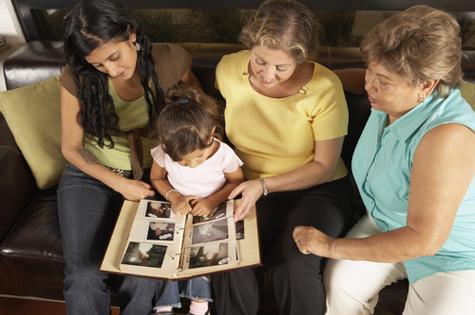I learned about the true significance of written memories when I was 22-years-old and my father died suddenly, unexpectedly.
In the days that followed I discovered my father’s journal, and it was in this moment I realised how little I truly knew about the life of my closest mentor. From this poignant experience Histography.com was born.
Histography.com is an online memory box that leads you through a series of thought-provoking questions designed to unearth the most interesting, unique and momentous aspects of your personality and life’s experience. These questions can be answered at your own pace, illustrated with uploaded photographs and, when you’re ready, can be printed as a beautiful hard cover book (as one or multiple copies).
I hope my experience, together with the site I've created, will inspire people around the world to record their story. But whether you use my website or not, here are my seven reasons why you should record your history.
1. Your kids might never find out
The regret of not asking a loved one something while you had the chance is a painful one, and it can last a lifetime. Do your children, and your grandchildren, a big favour and record your story for them. They may not know to ask a question until they’re more mature themselves but if you’re gone, they can’t. The value of your words in years to come can’t be described.
2. It’s inevitable that you’ll forget
As the years pass by, memories from our childhood become ghostlike, we forget more and more, and often we don’t remember something until someone else brings it up. Don’t ever forget how fragile, and incredibly precious, your memories really are.
3. Your memory plays tricks on you
There is such a thing as ‘false memory’. Researchers are starting to understand that the human mind can create, exaggerate, distort and even re-invent a memory.
Have you ever been describing childhood memory and your sibling pipes up, “That’s not what happened?!” As they correct you, a much clearer picture of the memory returns and you wonder how you ever created a ‘fake’ memory. Our brains are hardwired to ‘fill in the blanks’, so when we don’t remember the whole lot, our brain will trick us into thinking we do!
4. Storytelling actually strengthens your memory
When we write things down we tend to have an easier time remembering them and recalling the information more precisely. The more things you can tie together into a narrative, the more easily you’ll be able to recall those things later on. Think of it as studying for a test and taking valuable notes!
5. You’ll learn a thing or two
The scientific research into the health benefits of expressive writing is surprisingly far-reaching.
Writing down the moments you remember - the things that were important to you - provides you with unbelievable insight into the kind of person that you were, who you are today and who you want to become in the future. Some researchers even believe that by recording and then editing our own stories, it can lead to behavioural changes and improve happiness.
6. It doesn't take long
Writing your story doesn’t have to be a time consuming chore. Memoir writing programs such as Histography.com provide the platform to write your story in a way that is easy and time efficient.
7. It may change your life
Imagine if you had written down a nice memory a day for the past year. That would be equal to 365 memories. Now in this moment try to think of even 10 lovely memories in the past year. What about 50?
Unfortunately bad memories stay with us for much longer - the car breaking down, the heated conversation, the funeral. By recording the good times in your life will not only make sure you don’t lose these memories, but you’ll be choosing to live a life filled with happy memories that you can look to when life gets tough.
* * *
Editor's note: As someone who had too much family loss at a young age, this great song from Mike & the Mechanics is another reminder of why it's worthwhile taking notice of Michael McQueen's advice, whether you use his website or another mechanism.








 Agree (0)
Agree (0) Disagree (
Disagree (
__small.jpg)










__small.png)










